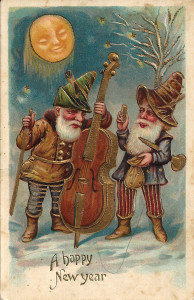SEVENTH DAY of CHRISTMAS:
New Year’s Day
Ring out the old,
Ring in the new,
Ring out the false,
Ring in the true.
The old year has passed and we awake hopeful for what the new year will bring. Good health is often at the top of the list, and this first day of the year, as the Seventh Day of Christmas, also happens to be a traditional wassailing day. Wassail, derived from the Old English toast Wes Hel: “Be of good health!”
The wassailing tradition is from Britain but is also practiced in many parts of the United States. Ale or beer or hard cider is warmed together with sugar, spices, apples and fruit juices, usually orange or pineapple. Lamb’s wool––whipped cream, essentially––is often floated on the top of the brew. The large wassail bowl is taken out to the orchard, where the custom is to wassail the oldest and largest tree in the grove. The ceremony, which usually takes place around midday, involves pouring wassail on the roots of the tree and hanging toasted bread soaked in wassail on its branches. The wassail bowl is, of course, passed around the company gathered, and all partake, along with great shouts of celebration (the word Huzzah seems particularly essential) and with songs, along the lines of this one from England:
Here’s to thee, old apple tree
Whence thou may’st bud and
whence thou may’st blow,
And whence thou may’st
bear apples enow.
Hats full, Caps full, Bushel,
bushel sacks full,
And my pockets full, too!
Huzzah!
Don’t have an apple tree to wassail? We don’t have them here in Lake Worth. Here, we grow oranges and grapefruits and mangoes and cocoanuts. You can wassail any tree, and why not? Trees that bear fruit are perhaps the most worthy of wassailing, but in the absence of one, I’d encourage you to wassail any tree that is your favorite.
Mumming and guising are also important customs on New Year’s Day. It’s a tradition known well in Philadelphia, where the annual Mummer’s Day Parade takes place each First of January as it has been since around the turn of the last century. The practice of mumming and guising, however, goes back much further than that. Mummer’s plays are another of the British Christmas traditions with pagan roots. The plays, typically performed by roving troupes, usually include characters like St. George and the Turkish Knight, dragons, and, of course, Father Christmas. Enter the players:
In comes I, Old Father Christmas,
Welcome or welcome not,
I hope Old Father Christmas
Will never be forgot.
If you don’t believe what I do say
Enter St. George and clear the way.
In come I, St. George,
A man of courage bold
With sword and spear all by my side,
Hoping to gain a crown of gold.
‘Twas I that slew the dragon,
and brought him to the slaughter,
And by those means I hope
To gain the King of Egypt’s daughter.
The plays are quick and typically involve the death of one character by the sword of another… but always a doctor is called in and the dead man is brought back to life. All of which echoes the death of the old year and its rebirth as the new, or the death of the sun at the solstice and its rebirth as the days begin to lengthen once more. The circle––or the ever expanding spiral––goes on and on, without end.

Lovely post, but I’m English and have never heard or read of anyone adding whipped cream to a wassail drink. Lambs’ wool seems to refer to the frothy cooked apple or possibly to the Lammas festival. It’s delicious, anyway.
I must admit to having doubts myself about the lambs wool as whipped cream, which is a story that came from one source. Further investigation seems in order! Perhaps I’ll have it right in time for next year’s wassailing. We shall see what we shall see.
i love the little guys in the picture